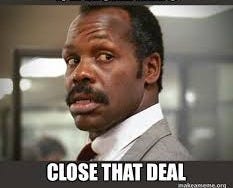How To Sell Anything - Lessons from Seye Bandele
If you’ve ever tried to land a job, get a promotion, pitch a product, or convince someone to say yes to your idea, you’re already a salesperson. This article will help you get better at it.
Hey friend,
Something happened yesterday that made me pause.
I was casually scrolling through Twitter (as one does on a lazy Friday afternoon) when I saw a meme that said:
“Founders be like: ‘I hate selling’ – yet they’re trying to raise money, onboard 1,000 users, and convince 3 engineers to join them for equity only.”
I laughed… then winced.
Because it was funny until it wasn’t.
It reminded me of Seye Bandele’s session at The Builders Summit. And so, the meme suddenly didn’t feel like a joke. It felt like a mirror.
We often treat "sales" like this awkward thing we’ll eventually hire someone else to do. But in those early days? It’s all you. And how you show up in those moments can determine whether your company survives long enough to even make a hire.
Let me share a few things Seye said that stuck with me, especially if you’re a founder, operator, builder, investor, or a student trying to pitch yourself for your next big break.
Seye said it plainly: in the early days, the founder is the business. You’re not just selling a product. You’re selling vision, trust, momentum, and belief.
And no one can sell the dream like the person who dreamt it.
So, what does it take to be a great salesperson?
Let’s break it down:
1. Tell Stories, Not Just Features
A great story builds emotional connection and makes your product feel less like software and more like something they’re part of. Humour, real moments, even your most awkward beta-launch fail, all of that can help people see themselves in what you're building.
2. Listen More Than You Talk
Good sales starts with listening. Ask better questions. Let people tell you what they need, then show them how you can meet it.
3. Build Trust Before You Make an Ask
Stop trying to "extract value" from people you haven't invested in.
Whether you're in a DM, a cold email, or a coffee chat, start by being useful. Offer a genuine insight. Ask about their challenges. Make it about them, not just your goal.
4. Rejection is Part of It
Even the best salespeople only close about 20% of the time. So if you’re hearing “no” a lot, congrats… you’re doing it right. The game isn’t avoiding rejection. It’s building the resilience to keep showing up in spite of it.
5. You Have to Close
A great conversation means nothing if it doesn’t lead somewhere. Always remember to close the deal. Don’t be afraid to ask for the next step - a meeting, a trial, an intro, a signature, a cheque - make the ask. Clarity moves things forward.
He also dropped this framework I liked because it’s simple, actionable, and easy to remember. It’s called SELL:
See the world through your audience’s eyes
Expose the problems they’re facing
Lead with relatability
Lock the ask (again, always remember to close the sale)
Your Saturday Takeaway
No matter how good your deck or your product is, if you can’t sell it, it won’t matter. Founders don’t need to become sleazy salespeople. They just need to become believers who communicate conviction.
So this weekend, talk to one customer. Or practice pitching your idea to a friend. Or rewrite your landing page with “emotional benefits” in mind.
You’re already selling every day. You might as well get really good at it.
(And yes, please share the video with your friends and community. I need to sell my job’s worth with views 😅. See what I did there?)





"See the world through your audience’s eyes": it’s the first thing to fo ! But before you can truly listen, you must first define, identify and map your audience. If you try to tune into everything, you’ll just end up drowning in noise and missing the signal.